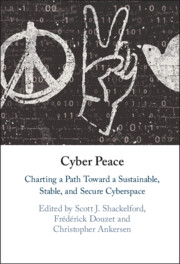‘Cyber space and outer space are today's cutting-edge areas of international security concern. One critical difference between them: We have norms in place for the preservation of peace in outer space. While these norms are contested, they provide the starting place for discussion. No comparable principles exist for cyber space – at least before now. Cyber Peace takes up the nascent idea that cyber space should never become battle space. The authors provide critical, normative scholarship necessary for the complex task of building cyber governance in the interest of human flourishing.'
Mary Ellen O'Connell - Robert and Marion Short Professor of Law and Research Professor of International Dispute Resolution—Kroc Institute for International Peace Studies, University of Notre Dame. Author of Cyber Security without Cyber War, Journal of Conflict and Security Law (2012)
‘Convening an expert group of academics and non-governmental organizations, Ankersen, Douzet and Shackelford offer a new framework for assessing international relations in a digital age – positive cyber peace. Expertly edited, their volume situates cyber peace in both international and intra-state contexts amidst the full range of technological developments in surveillance, offensive cyber operations, and machine learning. Along the way, they identify and elaborate practical mechanisms (e.g., information sharing, verification, international criminal law) for ensuring a future very different from the ongoing normalization of cyber insecurity.'
Duncan B. Hollis - Laura H. Carnell Professor of Law, Temple University
‘Is it possible to find peace in a digital world where cyberattacks continue to become more robust, sophisticated and dangerous? And how do we begin to define the term 'cyber peace?' The contributors to this important and timely volume explore an agenda for illuminating a concept that, despite its global impact, eludes easy definition and presents considerable difficulties. They also attempt to sketch a digital ecosystem in which resiliency, safety, and stability are possible despite major challenges. But by wrestling with these complex and intricate problems, they lay the groundwork for how humankind can make fundamental and transformative use of today's extraordinary technological advancements, including artificial intelligence and machine learning, without sacrificing our individual freedoms, our democracy, and our security.'
Michael A. McRobbie - University Chancellor, President Emeritus, and University Professor Indiana University





